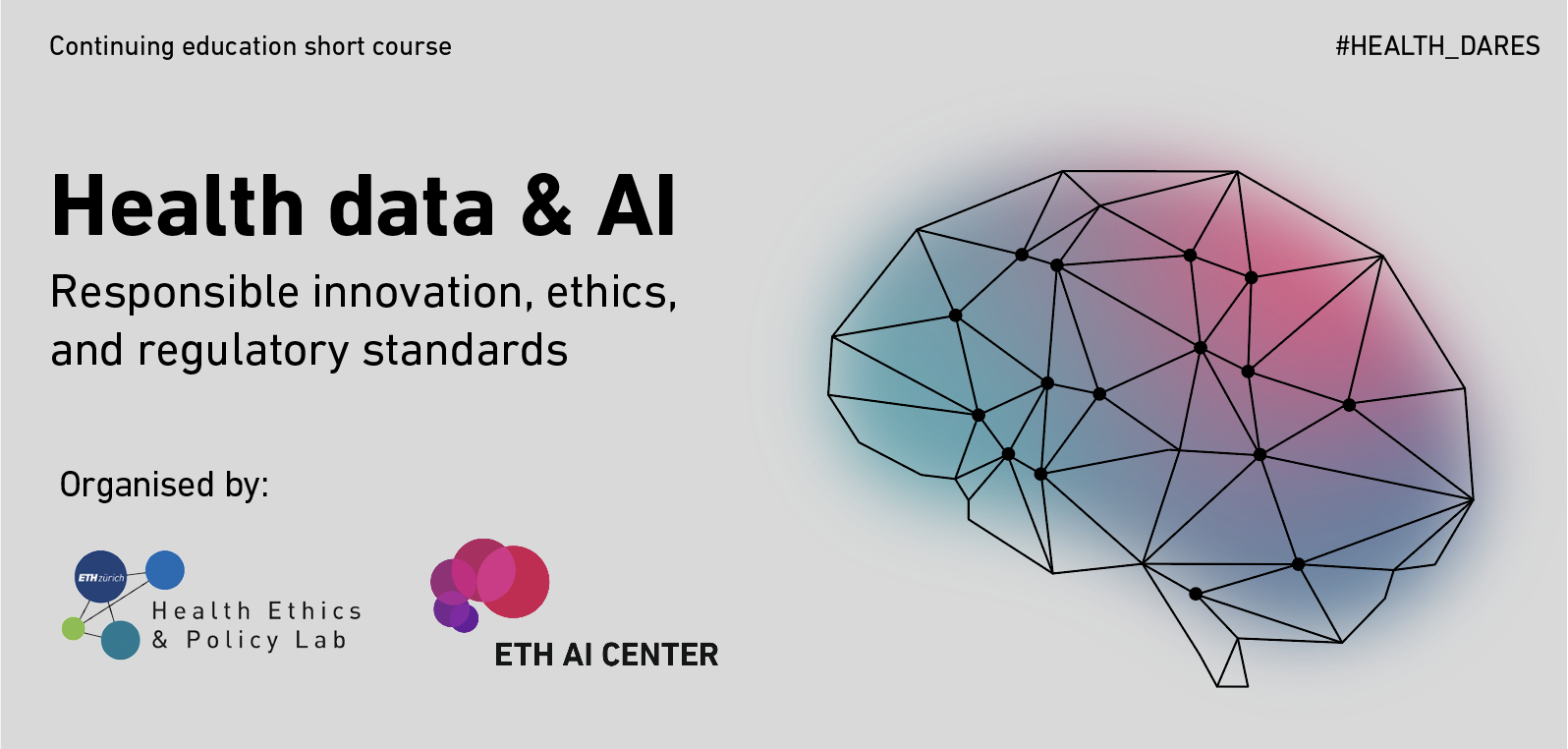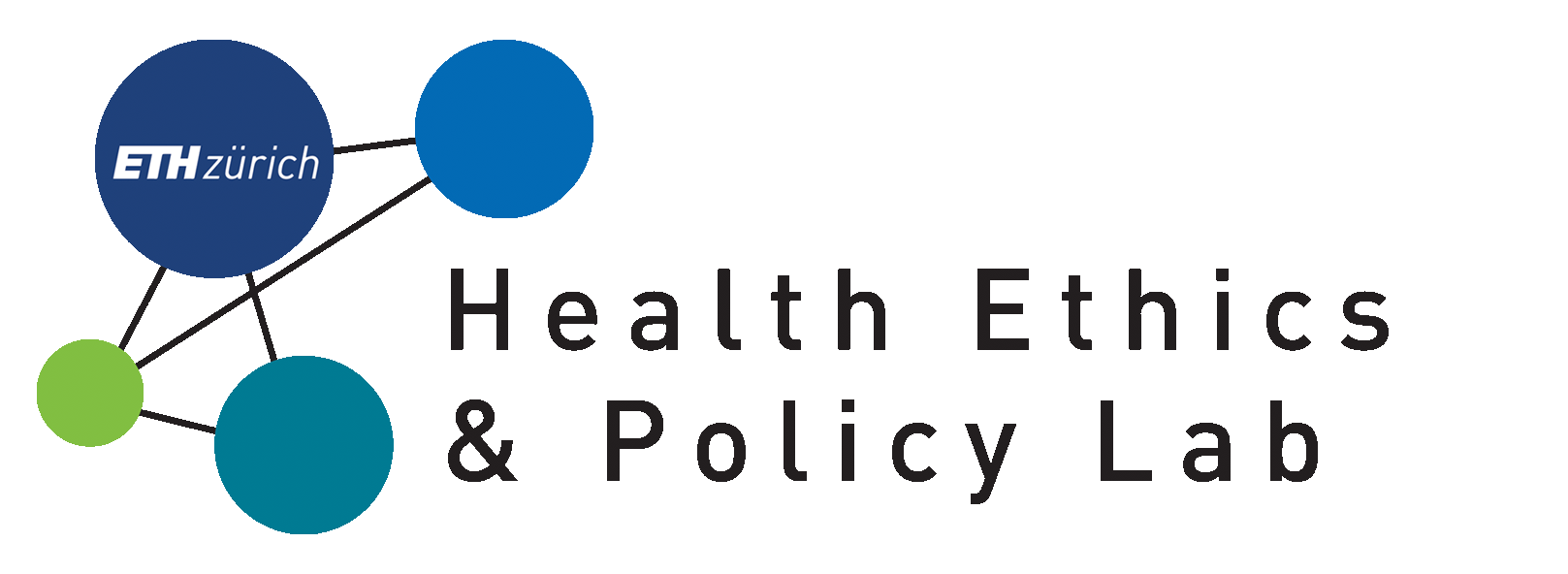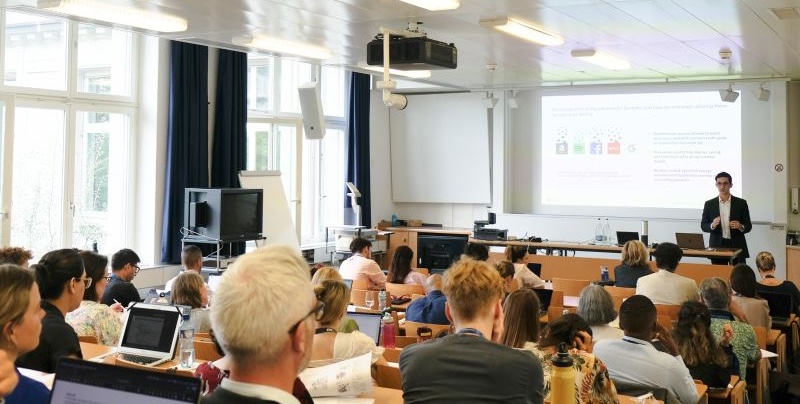Health Data and AI: Responsible Innovation, Ethics and Regulatory Strategies
Advanced Course - next edition January 2026

Course description
This three-day advanced course offers a critical overview and understanding of the ethical and regulatory challenges triggered by the use of big data and artificial intelligence (AI) in the health sector. Digital health technologies and AI have developed rapidly in recent years. The emergence of large language models and AI chatbots such as ChatGPT not only advanced their introduction in the health sector but also accentuated ethical concerns and regulatory uncertainties. The increasing potential for these technologies to have a significant impact on individuals and societies requires continuous engagement with the ethical and governance challenges they pose.
Through a combination of lectures, case studies and breakout sessions, the course examines some of the fundamental disruptions brought about by the use of AI and big data in health. It examines key multi-dimensional ethical and legal questions covering issues such as privacy, bias, transparency and explainability, equity and non-discrimination. It also reviews current regulatory trends and governance responses as well as emerging practical guidance, approaches and mechanisms aimed at supporting researchers and policy makers.
During the course, participants have the opportunity to learn from and interact with thought leaders, practitioners, and scholars and benefit from the international and dynamic academic environment of the ETH, and the exceptional density of public and private actors engaged in the field.
Target Group
The course is designed for international, multidisciplinary, and cross-sector participants. It is open to doctoral students and mid-level professionals active in academic research, the private sector and policymaking from various disciplines including computer science, political science, public policy, philosophy, population health, medicine, biomedical sciences, law, and engineering.
We encourage applications from AI developers, as well as researchers employed in the pharmaceutical, health insurance, and digital health industries, with a desire to expand their understanding of data ethics and AI’s impact on society.
Learning Goals
The course provides participants with the latest insights in current developments and equip them with the necessary competences, skills, tools, critical understanding and practical approaches to effectively address ethics and governance issues through their respective roles. By attending the “Health DARES” course, participants are able to:
- Understand the health data ecosystems, the data lifecycle and value chain, and the stakeholders involved.
- Identify and critically examine key ethical challenges related to the use of health data and AI through real- life examples and case studies.
- Evaluate current strategies and approaches to address some of the main ethical challenges, their strengths as well as limitations.
- Analyse regulatory trends and the frameworks governing data uses, AI and the health applications resulting from them.
Organisers

Health Ethics & Policy Lab
Department of Health Sciences & Technology, ETH Zurich
HOA H 12, Hottingerstrasse 10,
8092 Zürich
ETH AI Center
ETH Zurich
Universitätstrasse 6, CAB E 72
8092 Zürich
Details
Website
https://healthdares.ethz.ch/
Lecturers
The lecturers include policymakers, distinguished scholars from ETH, and guest lecturers from internationally renowned leading institutions and organizations.
Language
English
Certificate of attendance
Participants who complete the course will receive a certificate of attendance.
Past Courses
Advanced course 26-28 January, 2026
Documentation of Program
Website: https://healthdares.ethz.ch/

Speakers
- Alessandro Blasimme (ETH Zurich)
- Katrin Crameri (Federal Office of Public Health)
- Agata Ferretti (AI Alliance)
- Katharina Frey (ETH Zurich)
- Jean-Pierre Hubaux (EPFL)
- Marcello Ienca (TU Munich)
- Mikael Jensen (D-mærket/D-seal)
- Catherine Jutzeler (ETH Zurich)
- Sara Kijewski (ETH Zurich)
- Rohit Malpani (WHO)
- Timo Minssen (University of Copenhagen)
- Afua van Haasteren (Digital Connected Care Coalition)
- Eva von Mühlenen (Sidley Austin LLP)
- Gunnar Rätsch (ETH)
- Elettra Ronchi (WHO/Europe consultant)
- Barry Solaiman (HBKU)
- Eric Sutherland (OECD)
- Effy Vayena (ETH Zurich)
Advanced course 27-29 January, 2025

Documentation of Program
Website: https://healthdares.ethz.ch/
Advanced course 27-29 January, 2025
Speakers
- Alessandro Blasimme (ETH Zurich)
- Katrin Crameri (Federal Office of Public Health)
- Menna El-Assady (ETH AI Center)
- Agata Ferretti (AI Alliance)
- Jean-Pierre Hubaux (EPFL)
- Marcello Ienca (TU Munich)
- Mikael Jensen (D-mærket/D-seal)
- Sara Kijewski (ETH Zurich)
- Rohit Malpani (WHO)
- Timo Minssen (University of Copenhagen)
- Michael Moor (ETH Zurich)
- Eva von Mühlenen (Sidley Austin LLP)
- Elettra Ronchi (WHO/Europe consultant)
- Barry Solaiman (HBKU)
- Eric Sutherland (OECD)
- Effy Vayena (ETH Zurich)
- Robin Wirz (ETH Zurich)
Advanced course 29-31 January, 2024

Documentation of Program
Download Concept (PDF, 92 KB)
Speakers
- Alessandro Blasimme (ETH Zurich)
- Luca Baldassare (SwissRe)
- Katrin Crameri (SPHN & SIB Swiss Institute of Bioinformatics)
- Julien Durand (Sanofi/IFPMA)
- Menna El-Assady (ETH AI Center)
- Agata Ferretti (ETH Zurich)
- Jean-Pierre Hubaux (EPFL)
- Marcello Ienca (TU Munich)
- Mikael Jensen (D-mærket/D-seal)
- Sara Kijewski (ETH Zurich)
- Andreas Krause (ETH Zurich)
- Constantin Landers (ETH Zurich)
- Timo Minssen (University of Copenhagen)
- Eva von Mühlenen (Sidley Austin LLP)
- Andreas Reis (WHO)
- Elettra Ronchi (WHO/Europe consultant)
- Eric Sutherland (OECD)
- Simone Schürle-Finke (ETH Zurich)
- Effy Vayena (ETH Zurich)
Advanced course 5-7 September, 2022

Dcoumentation of Program
Download Program (PDF, 145 KB) and Download Information overview (PDF, 145 KB)
Speakers
- Agata Ferretti (ETH Zurich)
- Abdel Labbi (IBM Research, Zurich)
- Alessandro Blasimme (ETH Zurich)
- Andreas Krause (ETH AI Center)
- Andreas Reis (WHO)
- Effy Vayena (ETH Zurich)
- Elettra Ronchi (WHO/Europe consultant)
- Harpreet Sood (NHS England)
- Jean-Pierre Hubaux (EPFL)
- Josip Car (Imperial College London)
- Katrin Crameri (SPHN & SIB Swiss Institute of Bioinformatics)
- Knut Mager (Pharma Executive - on sabbatical)
- Menna El-Assady (ETH AI Center)
- Mikael Jensen (D-mærket/D-seal)
- Monica Epple (Swiss Re)
- Niniane Paeffgen (Swiss Digital Initiative)
- Timo Minssen (University of Copenhagen)
- Viknesh Sounderajah (Imperial College London)
- Wouter Lueks (EPFL)
- Xavier Vollenweider (Flowminder)